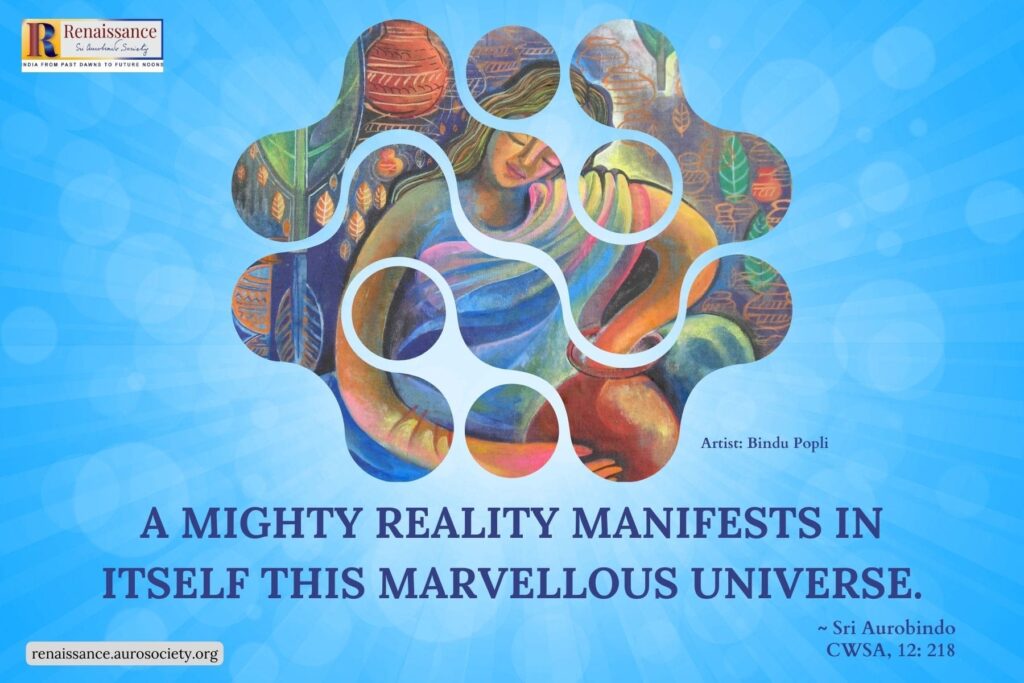Editor’s note: Integral Yoga is the triple labour of Aspiration, Rejection and Surrender. For our Guiding Light section, we feature here a few selections from Sri Aurobindo and the Mother which speak of a few fundamentals: What is the movement of aspiration; how is it different from desire; is one born with an aspiration or can it be developed; what is meant by the intensity of aspiration; and how does Grace respond to the sadhak’s aspiration.

The First Movement of Aspiration
The first movement of aspiration is this: you have a kind of vague sensation that behind the universe there is something which is worth knowing, which is probably (for you do not yet know it) the only thing worth living for, which can connect you with the Truth; something on which the universe depends but which does not depend upon the universe, something which still escapes your comprehension but which seems to you to be behind all things. . .
I have said here much more than the majority of people feel about the thing, but this is the beginning of the first aspiration—to know that, not to live in this perpetual falsehood where things are so perverted and artificial, this would be something pleasant; to find something that is worth living for.
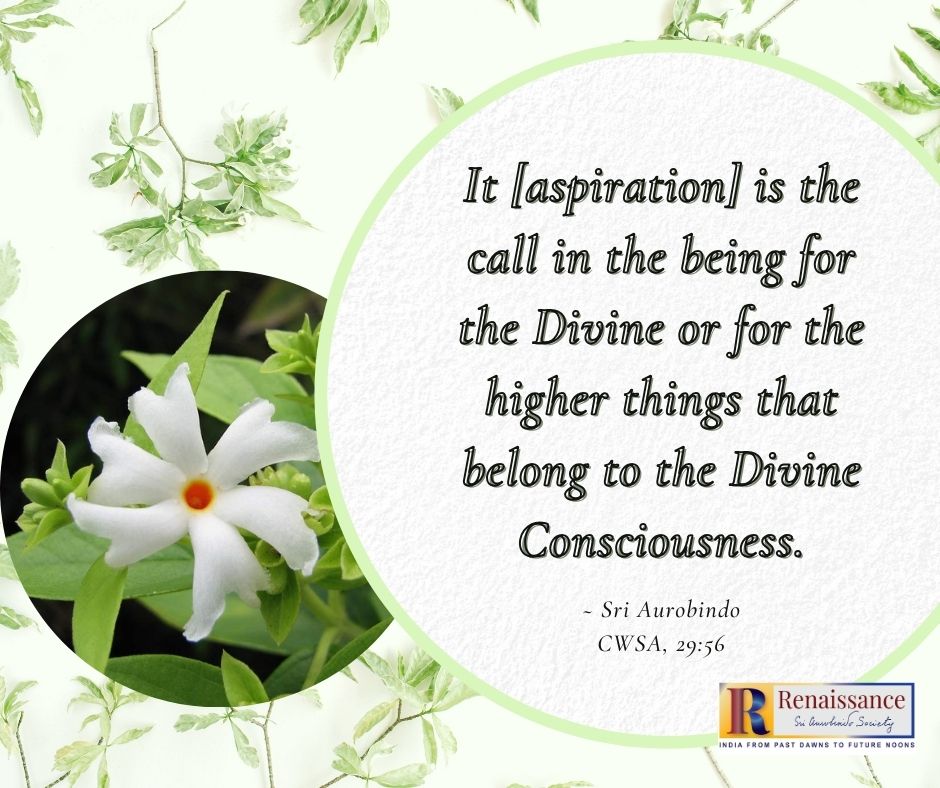
The next thing you have to do is to tend this aspiration, to keep it always alert and awake and living…
Instead of telling yourself once in a while, “Oh, yes! I am thinking of finding the Divine”, just when there is something unpleasant, when you are a little disgusted because you feel tired—indeed, there are very many flimsy reasons—all of a sudden you remember that there is such a thing as yoga, something like the Divine to know who can get you out of this flatness of life.
(The Mother, CWM, Vol. 6, pp. 67-68)
* * *
Difference between Aspiration and Desire
When you have experienced both, you can easily make the distinction. In aspiration there is what I might call an unselfish flame which is not present in desire. Your aspiration is not a turning back upon self—desire is always a turning back upon oneself.
From the purely psychological point of view, aspiration is a self-giving, always, while desire is always something which one draws to oneself; aspiration is something which gives itself, not necessarily in the form of thought but in the movement, in the vibration, in the vital impulse.
True aspiration does not come from the head; even when it is formulated by a thought, it springs up like a flame from the heart.
I do not know if you have read the articles Sri Aurobindo has written on the Vedas. He explains somewhere that these hymns were not written with the mind; they were not, as one thinks, prayers, but the expression of an aspiration which was an impulse, like a flame coming from the heart (though it is not the “heart” but the psychological centre of the being, to use the exact words). They were not “thought out”, words were not set to experiences, the experience came wholly formulated with the precise, exact, inevitable words—they could not be changed.
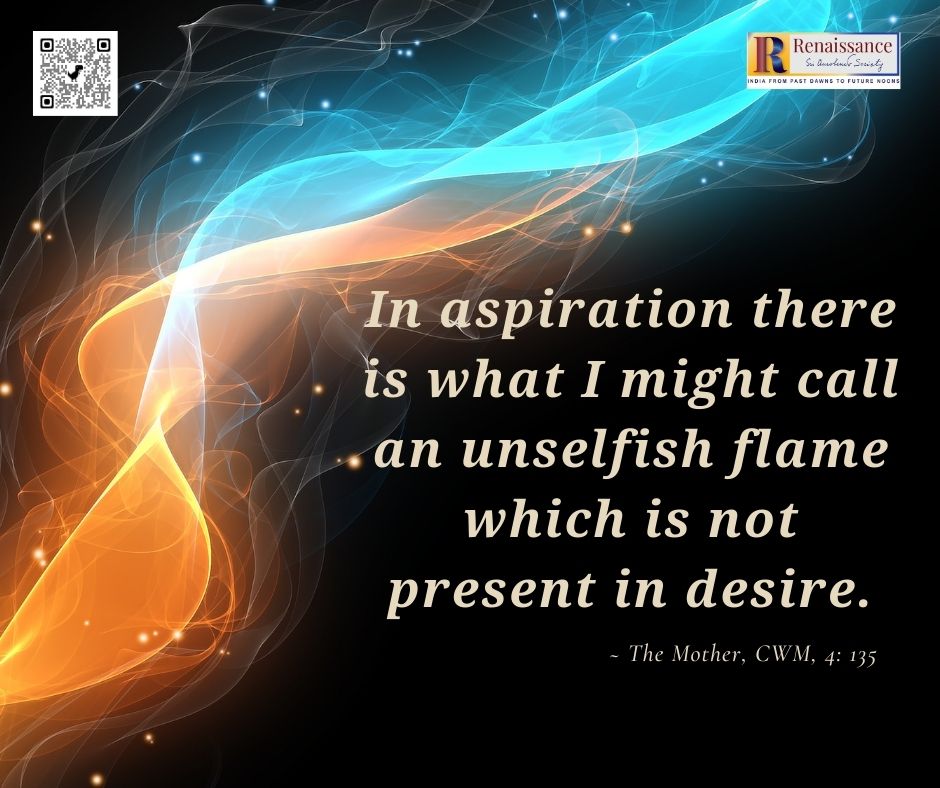
Read:
Be Conscious of Your Inner Flame
This is the very nature of aspiration: you do not seek to formulate it, it springs up from you like a ready flame. And if there are words (sometimes there aren’t any), they cannot be changed: you cannot replace one word by another, every word is just the apt one. When the aspiration is formulated, this is done categorically, absolutely, without any possibility of change. And it is always something that springs up and gives itself, whereas the very nature of desire is to pull things to oneself.
(The Mother, CWM, Vol. 4, pp. 135-136)
* * *
The Intensity of the Turning
The process of Yoga is a turning of the human soul from the egoistic state of consciousness absorbed in the outward appearances and attractions of things to a higher state in which the Transcendent and Universal can pour itself into the individual mould and transform it.
The first determining element of the siddhi is, therefore, the intensity of the turning, the force which directs the soul inward.
The power of aspiration of the heart, the force of the will, the concentration of the mind, the perseverance and determination of the applied energy are the measure of that intensity. The ideal sadhaka should be able to say in the Biblical phrase, “My zeal for the Lord has eaten me up.”
It is this zeal for the Lord,— utsāha, the zeal of the whole nature for its divine results, vyākulatā, the heart’s eagerness for the attainment of the Divine,—that devours the ego and breaks up the limitations of its petty and narrow mould for the full and wide reception of that which it seeks, that which, being universal, exceeds and, being transcendent, surpasses even the largest and highest individual self and nature.
(Sri Aurobindo, CWSA, Vol. 23, p. 58)
* * *

Take it Seriously
One cannot do the yoga if one does not take it seriously. For one must be very serious to have a constant aspiration and do tapasya.
If one is not serious, for five minutes one has an aspiration and for ten hours one hasn’t; for one day there is a great urge and for a month nothing, and so on. Well, one can’t do yoga in these conditions. It must be a continuous, constant thing which does not flag. If one forgets or slackens, one cannot do yoga.
Q: Should not one be born with a great aspiration?
No, aspiration is a thing to be developed, educated, like all activities of the being. One may be born with a very slight aspiration and develop it so much that it becomes very great. One may be born with a very small will and develop it and make it strong. It is a ridiculous idea to believe that things come to you like that, through a sort of grace, that if you are not given aspiration, you don’t have it—this is not true. . .
He [Sri Aurobindo] says you must choose, and the choice is constantly put before you and constantly you must choose, and if you do not choose, well, you will not be able to advance. You must choose; there is no “force like that” which chooses for you, or chance or luck or fate—this is not true.
Also Read:
Sādhanā: “That Flame is Indispensable”
Your will is free, it is deliberately left free and you have to choose. It is you who decide whether to seek the Light or not, whether to be the servitor of the Truth or not—it is you. Or whether to have an aspiration or not, it is you who choose.
And even when you are told, “Make your surrender total and the work will be done for you”, it is quite all right, but to make your surrender total, every day and at every moment you must choose to make your surrender total, otherwise you will not do it, it will not get done by itself. It is you who must want to do it.
When it is done, all goes well, when you have the Knowledge also, all goes well, and when you are identified with the Divine, all goes even better, but till then you must will, choose and decide. Don’t go to sleep lazily, saying, “Oh! The work will be done for me, I have nothing to do but let myself glide along with the stream.” Besides, it is not true, the work is not done by itself, because if the least little thing thwarts your little will, it says, “No, not that!…” Then?
(The Mother, CWM, Vol. 4, pp. 342-343)
* * *
Consecrate to God and God Only
All Yoga is in its nature a new birth; it is a birth out of the ordinary, the mentalised material life of man into a higher spiritual consciousness and a greater and diviner being. No Yoga can be successfully undertaken and followed unless there is a strong awakening to the necessity of that larger spiritual existence.
The soul that is called to this deep and vast inward change, may arrive in different ways to the initial departure.
It may come to it by its own natural development which has been leading it unconsciously towards the awakening; it may reach it through the influence of a religion or the attraction of a philosophy; it may approach it by a slow illumination or leap to it by a sudden touch or shock; it may be pushed or led to it by the pressure of outward circumstances or by an inward necessity, by a single word that breaks the seals of the mind or by long reflection, by the distant example of one who has trod the path or by contact and daily influence.
According to the nature and the circumstances the call will come. But in whatever way it comes, there must be a decision of the mind and the will and, as its result, a complete and effective self-consecration.
See:
The Triple Labour – Aspiration, Rejection, Surrender
The acceptance of a new spiritual idea-force and upward orientation in the being, an illumination, a turning or conversion seized on by the will and the heart’s aspiration,—this is the momentous act which contains as in a seed all the results that the Yoga has to give.
The mere idea or intellectual seeking of something higher beyond, however strongly grasped by the mind’s interest, is ineffective unless it is seized on by the heart as the one thing desirable and by the will as the one thing to be done.
For truth of the Spirit has not to be merely thought but to be lived, and to live it demands a unified single-mindedness of the being; so great a change as is contemplated by the Yoga is not to be effected by a divided will or by a small portion of the energy or by a hesitating mind. He who seeks the Divine must consecrate himself to God and to God only.
(Sri Aurobindo, CWSA, Vol. 23, pp. 69-70)
* * *
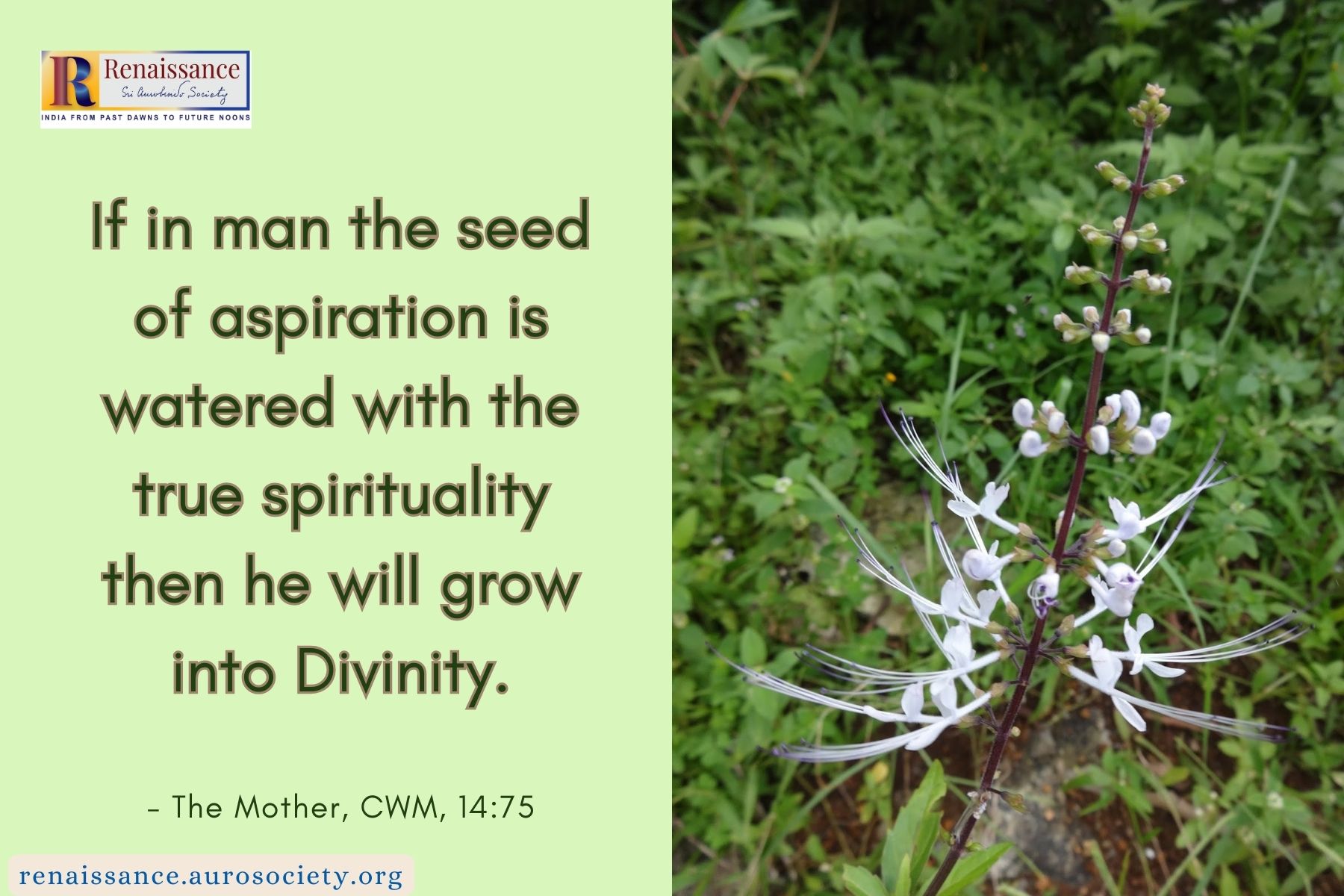
A Supreme Goodwill Arranges Everything
If you are in a state of conscious aspiration and very sincere, well, everything around you will be arranged in order to help in your aspiration, whether directly or indirectly, that is, either to make you progress, put you in touch with something new or to eliminate from your nature something that has to disappear. This is something quite remarkable.
If you are truly in a state of intensity of aspiration, there is not a circumstance which does not come to help you to realise this aspiration.
Everything comes, everything, as though there were a perfect and absolute consciousness organising around you all things, and you yourself in your outer ignorance may not recognise it and may protest at first against the circumstances as they show themselves, may complain, may try to change them; but after a while, when you have become wiser, and there is a certain distance between you and the event, well, you will realise that it was just what you needed to do to make the necessary progress.
And, you know, it is a will, a supreme goodwill which arranges all things around you, and even when you complain and protest instead of accepting, it is exactly at such moments that it acts most effectively.
Not to be missed: Aspiration and the Psychic Being
[. . .] If you say to the Divine with conviction, “I want only You”, the Divine will arrange all the circumstances in such a way as to compel you to be sincere. Something in the being. . . “I want only You” . . . the aspiration. . . and then one wants a hundred odd things all the time, isn’t that so?
At times something comes, just . . . usually to disturb everything—it stands in the way and prevents you from realising your aspiration. Well, the Divine will come without showing Himself, without your seeing Him, without your having any inkling of it, and He will arrange all the circumstances in such a way that everything that prevents you from belonging solely to the Divine will be removed from your path, inevitably.
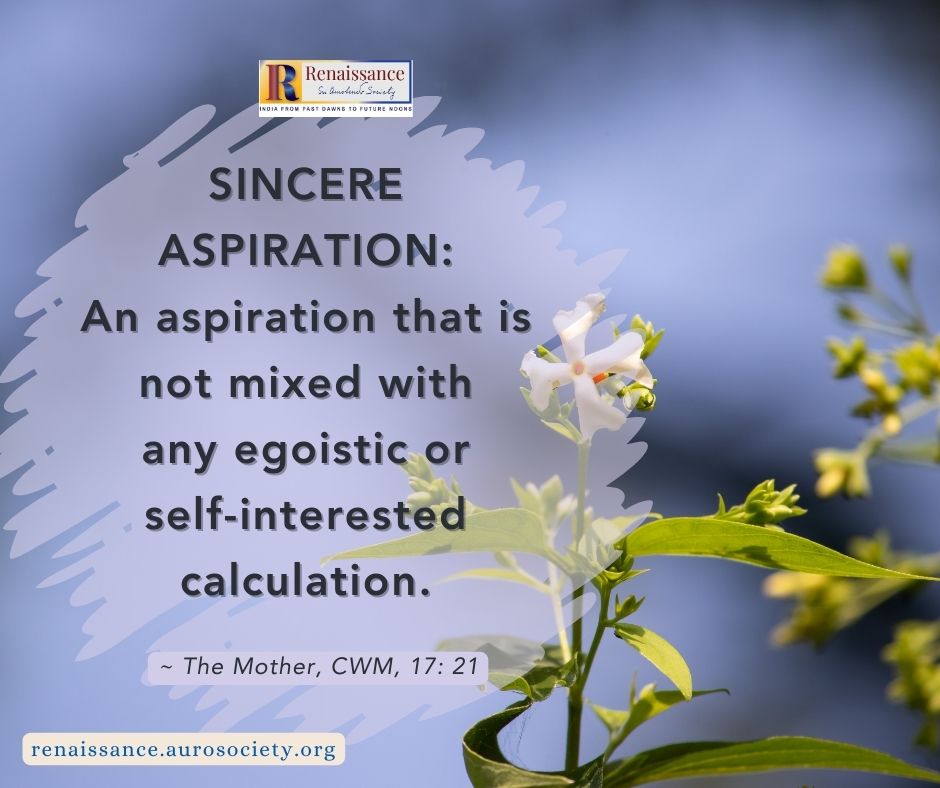
Then when all is removed, you begin to howl and complain; but later, if you are sincere and look at yourself straight in the eye. . . you have said to the Lord, you have said, “I want only You.” He will remain close to you, all the rest will go away. This is indeed a higher Grace. Only, you must say this with conviction.
I don’t even mean that you must say it integrally, because if one says it integrally, the work is done. What is necessary is that one part of the being, indeed the central will, says it with conviction: “I want only You.” Even once, and it suffices: all that takes more or less long, sometimes it stretches over years, but one reaches the goal.
(The Mother, CWM, Vol. 6, pp. 176-177)

Nature Aspires Too!
Click HERE to read words of the Mother about aspiration in plants and animals.
~ Design: Biswajita Mohapatra and Beloo Mehra

